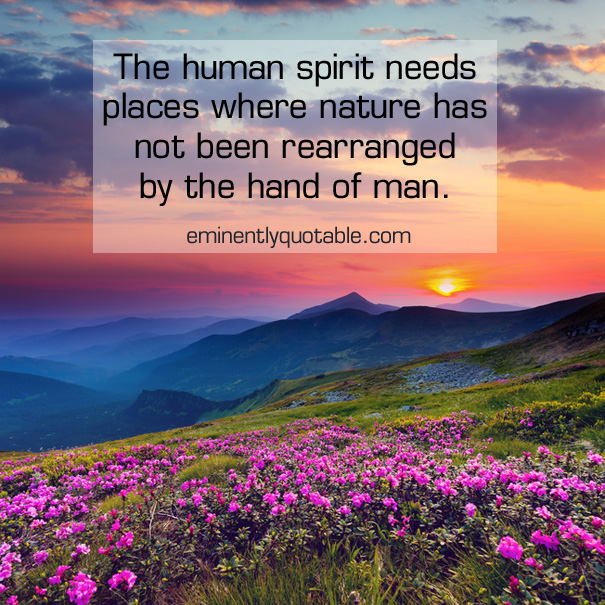
graphic © eminentlyquotable.com | photo – Fotolia
“The human spirit needs places where nature has not been rearranged by the hand of man.”
The study by Randy White, the CEO of White Hutchinson and Leisure Group, explored the lack of exposure in nature in today’s children. She highlighted the significant benefits children can get from being able to play in a natural outdoor environment. It is a venue for exploration and the development of life-preserving values.
Ecotherapy is beneficial to people in all ages. It was reported that the green in nature decreases children’s stress levels. The same happens to adult people: being exposed to nature more often improves their emotional, mental, and physical state, according to the author of The Nature Principle, Richard Louv.
The Nature Conservancy’s lead scientist, M. Sanjayan, Ph.D., attributed it to his belief that humans are biophilic. Earlier humans depend on nature in almost anything, until industrialization changed the natural order. Sanjayan termed “nature-deficit disorder” to describe the adverse effects of being away from nature such as depression, obesity, and even cancer.
While a manicured garden is pleasing to the eyes, an undisturbed corner can actually help wildlife in winter, according to The RSPCA or Royal Society for the Prevention of Cruelty to Animals. A wildlife garden is slowly gaining popularity as more people know of its benefits to them and to other creatures. A wild garden requires little maintenance, allowing nature to take its course and decide what’s best for itself.
Brilliant minds are no stranger to the cognitive effects brought by nature. Albert Einstein once said, “Look deep into nature, and then you will understand everything better.”
😳 What Tinnitus Does To Your Brain Cells (And How To Stop It)
After 47 years of studies and countless brain scans done on more than 2,400 tinnitus patients, scientists at the MIT Institute found that in a shocking 96% of cases, tinnitus was actually shrinking their brain cells.
As it turns out, tinnitus and brain health are strongly linked.
Even more interesting: The reason why top army officials are not deaf after decades of hearing machine guns, bombs going off and helicopter noises…
Is because they are using something called "the wire method", a simple protocol inspired by a classified surgery on deaf people from the 1950s...
★ How To Get Rid Of Nail Fungus:
★ Does Your Salad Contain This Vegetable?
★ Top 10 Most Valuable Medicinal Herbs:





